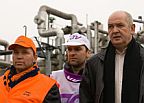Home > “Human beings and hard work” - the secret of Europe’s most successful left (...)
“Human beings and hard work” - the secret of Europe’s most successful left party.
by Open-Publishing - Wednesday 20 December 2006
On November 22nd, the Socialist Party of the Netherlands won 1.6 million votes for its combattive, radical left programme. This was more than ten times what it won 12 years ago, and three times the total for 2003. How was this achieved?
Europe’s most successful party of the left gathered last weekend in Utrecht for its first major event since the extraordinary night of November 22nd, when it almost tripled its representation to become the third biggest group in the national parliament and a real third force in Dutch politics. This was the quarterly meeting Party Council, which, subordinate only to national conferences, is the Socialist Party’s ruling body.
The question I wanted to put to the assembled delegates, elected representatives and party workers was this: how can the Left in the rest of Europe, which has not known its best years over the last couple of decades, learn from the experience of a party that, in the same period, has moved from the outer fringes of the extra-parliamentary far left to the very centre of its country’s political life? One factor is certainly Jan Marijnissen. Leader since 1989, he is both charismatic and politically astute, qualities which have made him popular well beyond the Left’s usual consituency. Few doubt his honesty and integrity, qualities highly valued in the Netherlands. National Secretary Hans van Heiningen, who organised the campaign, said that “Local activism gave us the spur. Parties from the left which scorn activism amongst the people lose contact with real people and become a parody of themselves. You need a good party organisation, internal education to make sure you can fill positions with suitable people. Human capital is our most important capital.”
The SP is, in other words, a lot more than a vote-winning machine. Current high-profile national campaigns cover issues as varied as liberalisation in public transport and health care, conservation of areas of natural beauty, the transport of nuclear fuel and dangerous chemicals through populated areas, hunting, and compensation for asbestos victims. Whoever you speak to in the SP, the message is always the same: the SP is successful because it goes out to the people. Education is emphasized at all levels of the party. The SP is acutely aware that many of the thousands of people now flooding into the party have little or no political experience. A newly-elected MP, Sadet Karabulut stressed the importance of “distinguishing between new members and party cadre. If you’re preparing an experienced person to run for the council, that’s different from giving new members a political base. We need to tell these new members what the SP stands for, to discuss specific policy issues with them.” Another delegate chipped in with an example: “We had an influx of new members not long ago so we organised three evening sessions, two on ’what is the SP?’ and a final one in which we divided into groups. Each group came up with a proposed action relating to some problem in the area, and then discussed what form the action should take. This both educated new members and generated some useful practical suggestions.”
Another factor is undoubtedly finance. Elected representatives hand their salaries over to the party, being paid a wage based on that of an average industrial worker. Local Councillors and MPs alike must also deduct only receipted out-of-pocket expenses from the generous daily rates paid by the state, giving the rest to the SP. This gives the party both a steady income and a lot of respect, even from its opponents.
The SP’s leader in the Senate is now Tiny Kox, national secretary during the party’s first period of accelrated growth in the 1990s. I asked him what general lessons could be drawn from his party’s extraordinary success story. “First of all it’s very important to be undogmatic,” he said. “You have to question everything, including your own ideas and practices. You must always adapt to changing circumstances. Just as importantly, however, you have to decide on your core beliefs and make these an anchor for your party and its work. The three basic principles in our party constitution and programme are clear: equality, solidarity, and respect for human dignity, indeed respect for all that lives. “Secondly, you must always remember that you are a union of people, a movement, not just a parliamentary or media machine. “And finally, pay attention to the quality of your campaigns.”
Euro-MP Kartika Liotard added that, in her experience, what the SP demonstrated most starkly was the need “to build from the bottom up, getting out into the streets and workplaces and asking people about their grievances, explaining what socialism is and how it can address these grievances, helping people to organise, standing with them in a spirit of solidarity.” In November, the SP presented a truly socialist programme for the 21st Century. And, in one of Europe’s most developed countries, one in six voters liked what they saw.
Is then the secret of the SP’s success simply a gifted leader? Dedicated activists? An immersion in the population which makes it seem to have a sixth sense about the way opinion is shifting and what needs to be done about it? The last word should go to Jan Marijnissen: “There is no secret,” he told me. “It’s just about human beings, and hard work.”
Steve McGiffen 19/12/06
Steve McGiffen is the English language translator for the SP. He lives in France.




